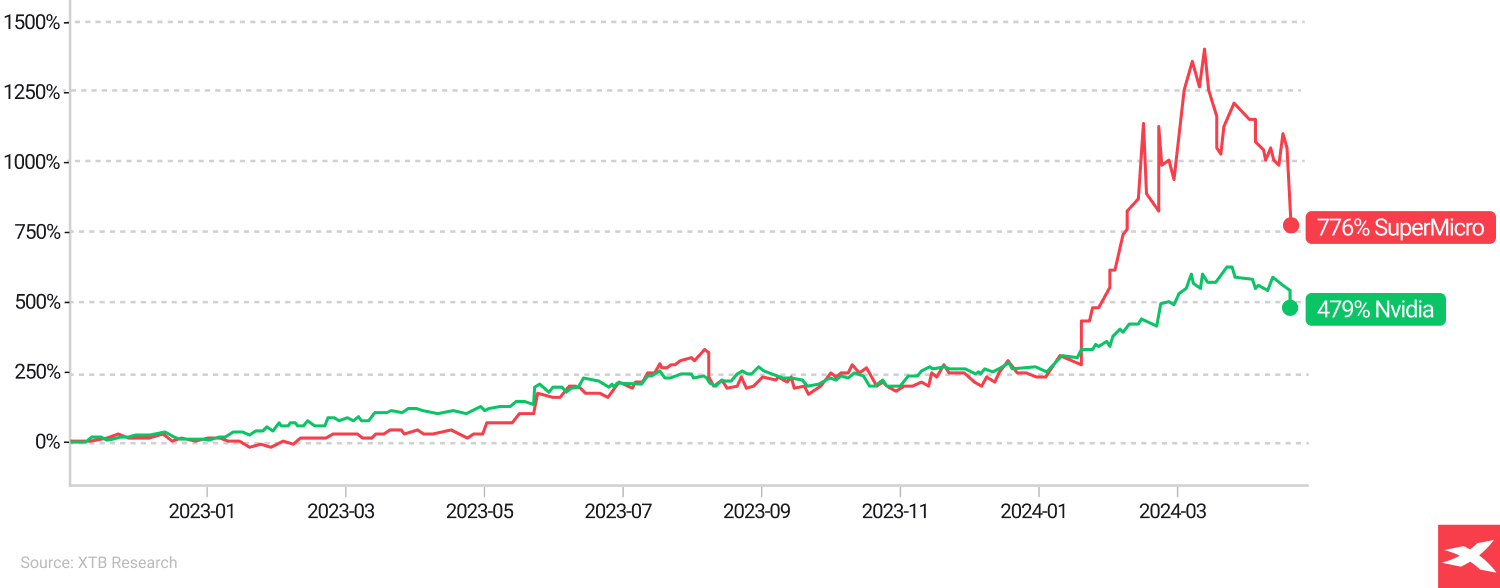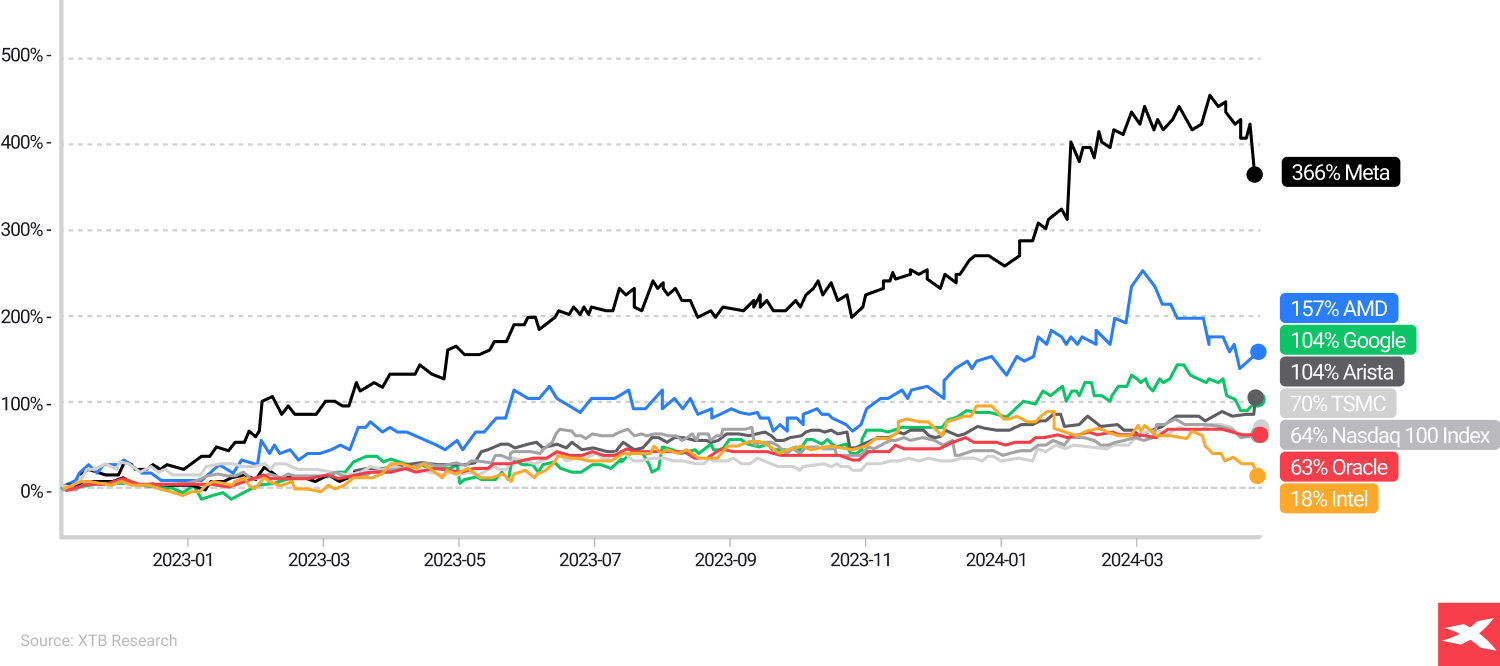Do you agree that technology will transform the world in the following decades? If yes, one may consider investments in the technology sector. After generative intelligence entered the business world, financial markets tried to value this historic change. It’s powerful enough to completely change some companies' valuation and disrupt business models. It’s really hard to choose winners, without risking investing in losers, as technology is changing constantly. Choosing stocks related to AI for some investors may be too risky and bring additional risks. Professional and individual investors often use exchange traded funds.
Why? Those instruments give the opportunity to have well-balanced exposure to all technology, including the AI sector. This limits the potential of investing only in future winners, but it also limits the risk of investing in wrong companies, with inherent risks related to such investments. Navigating the growth of the artificial intelligence trend, our focused guide on ETFs which offer directly and indirectly exposure to AI. We will show pros and cons and try to identify key strategies for AI, focusing on Nasdaq100.
Do you agree that technology will transform the world in the following decades? If yes, one may consider investments in the technology sector. After generative intelligence entered the business world, financial markets tried to value this historic change. It’s powerful enough to completely change some companies' valuation and disrupt business models. It’s really hard to choose winners, without risking investing in losers, as technology is changing constantly. Choosing stocks related to AI for some investors may be too risky and bring additional risks. Professional and individual investors often use exchange traded funds.
Why? Those instruments give the opportunity to have well-balanced exposure to all technology, including the AI sector. This limits the potential of investing only in future winners, but it also limits the risk of investing in wrong companies, with inherent risks related to such investments. Navigating the growth of the artificial intelligence trend, our focused guide on ETFs which offer directly and indirectly exposure to AI. We will show pros and cons and try to identify key strategies for AI, focusing on Nasdaq100.
Key Takeaways
- Investors, who want to benefit from AI trends have three, basic opportunities: buying stocks, investing in ETFs or mixing both strategies.
- As artificial intelligence is a disruptive technology, with unknown results in the future, it may be hard to predict long term winners, with no risk of investing in possible losers.
- ETFs such as Nasdaq100 offer investors diversified exposure to the artificial intelligence market, encompassing companies from US hardware manufacturers to innovative AI technology firms.
- Instead of betting on a single one or a few companies, ETF offers investing in dozens or hundreds of them simultaneously. It gives exposure to all-sector performance, rather than single stock.
- Adopting various strategies to incorporate these ETFs into a well-balanced investment portfolio, may be a key to manage risk and hedging.
 Since the GPT inception in the fall of 2022 to April 2024, AI-related stocks such as Nvidia (the biggest AI chips producer and technology provider) and Super Micro Computers (producer of server-racks for data centres) surged. However, volatility of these stocks is high, and concentration risk may be not accepted by some investors seeking diversification.
Since the GPT inception in the fall of 2022 to April 2024, AI-related stocks such as Nvidia (the biggest AI chips producer and technology provider) and Super Micro Computers (producer of server-racks for data centres) surged. However, volatility of these stocks is high, and concentration risk may be not accepted by some investors seeking diversification.
Past performance is not a reliable indicator of future results. Source: XTB Research, Bloomberg Finance LP
Understanding AI ETFs
Functioning similarly to individual stocks, AI ETFs are investment funds that focus on companies involved in AI development. However, they offer an added advantage of diversification. Companies are chosen for inclusion in AI ETFs based on their involvement in AI-related activities. From AI chipmakers producing the necessary hardware to AI startups developing cutting-edge AI tools and technologies. Investing in an AI ETF is akin to buying a piece of the entire AI market, providing exposure to a wide array of stocks, which include both established and emerging players.
Types of AI ETFs
AI ETFs can be broadly categorised into two, basic types:
- Technology ETFs: These concentrate on investing in companies within the technology sector. Including those involved more directly in AI technology and the semiconductor industry.
- Thematic ETFs: These focus on specific themes in some way related to AI, such as robotics or autonomous vehicles.
Thematic ETFs, on the other hand, are designed around specific industries, trends, or themes. They aim to capitalise on the growth of the AI market within the stock market. But as we mentioned it’s still hard to predict winners, and it’s also hard to predict which sector will grow “due to AI” revolution in the long run. Technology ETFs may be a much more conservative choice.
Evaluating AI ETFs: Key Factors
Factors like expense ratios, past performance, and diversification should be considered when evaluating AI ETFs. Here are some key factors to consider:
- Expense ratios: Representing the fees charged by the ETF provider, can directly impact the long-term returns of an AI ETF. In general, “the cheaper, the better”.
- Past performance: Taking into account historical performance is crucial, as it provides insight into the ETF’s ability to track its underlying index or investment strategy over time. Remember that even superior performances do not guarantee successful returns
- Diversification: Evaluating the diversification of an AI ETF can help determine its risk profile and potential for long-term growth. Always try to analyse how “concentrated” an ETF is and the more concentrated it is, the higher risk related to some “sector disruptions” it brings.
The art of diversification
Diversification, on the other hand, can help mitigate risk by spreading investments across various AI subgroups, asset classes, sectors, and geographic regions, thus reducing the risks associated with any individual investment. The underlying index, which dictates the performance and investment strategy of the ETF, is another significant aspect to understand.
Remember that diversification is not limited to just one ETF, as world-class investment manager Ray Dalio suggests that any investor should consider buying uncorrelated assets, which may limit overall portfolio risk. Investors may consider AI ETF exposure not only as a portfolio fundamental but also as a part of broader strategy but should know that imperfect diversification may not generate superior results and in general diversification usually mean lower investment returns.
Top AI ETFs
ETFs that tackle the AI topic are:
- iShares Nasdaq100 UCITS ETF
- Wisdom Tree Artificial Intelligence UCITS ETF
- iShares Information technology ETF UCITS
- Amundi MSCI World Information Technology UCITS ETF
- iShares S&P 500 Information technology sector UCITS ETF
- iSharers Electric Vehicles and Driving technology UCITS ETF
- xTracker Artificial intelligence and Big Data UCITS ETF
- Global X Robotics & Artificial Intelligence UCITS ETF
- L&G Artificial intelligence UCITS ETF
- iShares Automation and Robotics UCITS ETF
- VanEck Semiconductor UCITS ETF
These ETFs offer diversified exposure to a range of publicly traded companies involved in artificial intelligence stocks and related technologies, related with such sectors as:
- Technology software and data centres
- Cloud and information technology
- Semiconductors and equipment
- Digital ads and media
- Robotics and automation
- Autonomous cars
All mentioned sectors above are in some way related to AI. Further AI development may change each of these industries. Some of the biggest technology companies such as Nvidia, Alphabet and Microsoft are present in almost all mentioned ETFs. The best source to learn more about any of the mentioned ETF is the official site, related to each one. Remember that “weights” of companies across each ETF portfolio may play a key role. The most popular one is iShares Nasdaq100 which gives investors exposure to 100 companies stocks from tech-heavy and world biggest US industries.
Pros and cons![]()
Like any other investment, AI ETFs also come with their share of risks. Primary risks include market volatility and regulatory changes that could impact the AI industry and, consequently, the performance of AI ETFs. AI-powered ETFs, however, have the ability to adjust their asset allocation to favour investments that are anticipated to perform well during periods of market volatility.
However, the potential benefits of investing in AI ETFs are significant, including diversification, adaptability to new market data, and the ability to leverage the growth of the AI sector. AI ETFs offer exposure to a broad range of AI companies, providing investors with the chance to benefit from the industry’s potential growth.
Let’s analyse pros and cons of AI ETF investing, for investors who accept that diversification usually lowers investment returns, but also limits inherent risks related to undiversified investment.
Pros
- Diversification: ETFs spread investment across numerous stocks, reducing the risk tied to relying on a single or small group of companies.
- Technology Exposure: The tech sector has historically delivered strong returns. The rise of AI suggests this trend might continue, though future performance is uncertain.
- Efficiency: ETFs offer a convenient way to access diversified portfolios without in-depth research on individual stocks. While not risk-free, they simplify investment.
- Cost-Effective and Versatile: Often cheaper than mutual funds, ETFs provide broad market exposure. As AI impacts various sectors, the growing range of ETF options caters to different investment goals.
- Strategic Investment Tool: Investing requires careful consideration. ETFs are relatively easy to understand and suit both experienced and novice investors. They're a cornerstone of many passive investment strategies.
Cons
- Risk of Underperformance: ETFs, especially those focused on specific sectors like AI, can underperform the broader market. Market trends are unpredictable, and popular investments may become overvalued, leading to potential bubbles. Careful ETF selection is crucial as performance can vary widely.
- Diversification Dilemma: While diversification is essential for managing risk, excessive diversification can hinder returns. Holding a large number of assets might dampen the impact of top-performing investments. Balancing risk and reward is key.
- Cost Considerations: ETFs come with fees (TER) that can erode returns over time. While these fees vary, they can be more significant than the costs of owning individual stocks. Investors should consider this when comparing ETF and stock investments.
- Potential for Limited Growth: ETFs provide broad market exposure but may not capture the full upside of star performers. Investors seeking maximum growth potential might consider individual stock selection, although this comes with increased risk.
AI ETFs investment portfolio
Several strategies can be contemplated by investors when incorporating AI ETFs into their investment portfolio. These include:
- Utilising AI to define a comprehensive investment strategy
- Diversifying with AI-focused ETFs
- Exploring thematic ETFs for a more concentrated approach on pure play AI firms
- Maintaining a diverse mix of ETFs across different sectors and asset classes
Risk tolerance is an important consideration when incorporating AI ETFs into an investment portfolio. Investors with a higher risk tolerance may find AI ETFs particularly appealing due to their potential for increased returns and suitable risk exposure. To achieve portfolio diversification across different asset classes, sectors, and regions, it is vital to maintain a balanced portfolio that includes AI ETFs along with other types of investments.
AI ETFs vs Stocks
A common question among investors interested in the AI space is whether to opt for AI ETFs or individual AI stocks. AI ETFs offer investors the opportunity to gain exposure to a variety of AI stocks, thereby enabling diversification. In contrast, investing in individual AI stocks entails purchasing shares of particular companies engaged in AI development.
Investing in AI ETFs offers the following benefits:
- Exposure to a diverse selection of top AI companies, eliminating the necessity for researching and selecting individual stocks.
- Utilisation of risk management strategies like portfolio optimisation and diversification to mitigate risk.
- Specialised yet diversified investment approach in the technology sector by offering access to a variety of AI companies, aiding in distributing investment risk across multiple entities.

As we can see, since the fall of 2022 to April 2024 some of the biggest AI-related stocks (data centres, semiconductors, software, digital ads) outperformed Nasdaq 100 returns but Oracle and Intel underperformed tech-heavy US benchmarks.
Past performance does not guarantee future results. Source: XTB Research, Bloomberg Finance LP
The Future of AI and Its Impact on Investing
As we look to the future, it is expected that AI will exert a significant influence on investment strategies. With the ability to drive economic expansion, enhance technological capacities, and revolutionise investment processes, AI presents numerous opportunities for investors. However, potential risks associated with investing in AI should also be considered. These include:
The inadvertent perpetuation or amplification of societal biases
- Lack of transparency and explainability
- Job losses due to AI automation
- Social manipulation through AI algorithms
The future advancement of AI could have an impact on the performance of AI ETFs by providing them with the capability to:
- Utilise advanced risk management techniques like portfolio optimisation and diversification in order to mitigate risk
- Improve decision-making processes and enhance investment strategies
- Analyse large amounts of data quickly and accurately to identify trends and patterns
- Automate trading and reduce human error
Furthermore, there has been notable performance variability among AI ETFs, with leading thematic strategies delivering impressive returns.
Summary
In conclusion, AI ETFs present an interesting investment opportunity for those looking to capitalise on the growth and potential of the AI industry. By understanding the different types of AI ETFs, investors will be able to choose the best tools to realise investment strategy. Evaluating key factors to consider when investing are understanding the risks and potential rewards.
Investors should look at investing costs and choose the right assets to achieve long term investment goals. Overall impact of AI on investing is expected to grow, but investors should also know that if valuations are very high, AI trends may be not enough to drive those even higher. A major risk for any AI ETF is possible economic slowdown. Investors should know well the importance of understanding and incorporating ETFs into investment portfolios.
FAQ
Based on the comparison of return and performance, the best ETF for AI can be determined by analysing the data on AI ETFs. When looking for the best ETF for AI, consider the one with the strongest return and performance.
No, Vanguard does not have a dedicated artificial intelligence ETF. However, the Vanguard Information Technology ETF (VGT) includes some AI exposure.
It’s hard to identify the best AI opportunity to invest in. Investors should do their own research and accept the high risk of those investments. One can check AI companies, related to AI-trend such as NVIDIA Corporation (NVDA.US) and AMD (AMD.US) for its development of high-end GPUs and expansion into AI capabilities, alongside with Arista Networks (ANET.US) or SuperMicro Computer (SMCI.US) which can expand business due to higher CAPEX across data centres sector. Although, it is very important to do your own research.
To invest in AI stocks in the UK, open a brokerage account with an online platform offering AI-focused stocks and funds such as XTB. Diversify your investments and stay informed about AI industry trends to make informed decisions.
AI ETFs are investment funds that focus on companies involved in AI development, providing diversification and exposure to the growing AI industry.

ETF Investment Strategy: Maximising profits and limiting risk

Climate change investments: Maximising impact

Best ETFs to Look Out For
This content has been created by XTB S.A. This service is provided by XTB S.A., with its registered office in Warsaw, at Prosta 67, 00-838 Warsaw, Poland, entered in the register of entrepreneurs of the National Court Register (Krajowy Rejestr Sądowy) conducted by District Court for the Capital City of Warsaw, XII Commercial Division of the National Court Register under KRS number 0000217580, REGON number 015803782 and Tax Identification Number (NIP) 527-24-43-955, with the fully paid up share capital in the amount of PLN 5.869.181,75. XTB S.A. conducts brokerage activities on the basis of the license granted by Polish Securities and Exchange Commission on 8th November 2005 No. DDM-M-4021-57-1/2005 and is supervised by Polish Supervision Authority.



